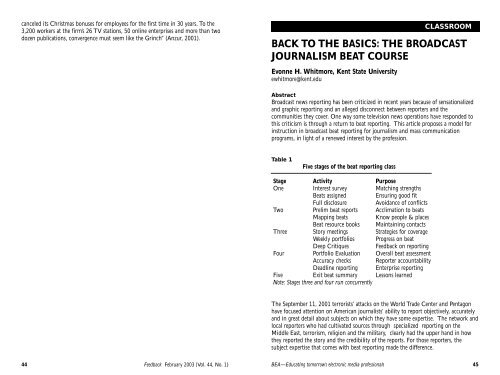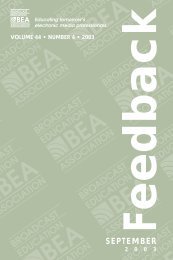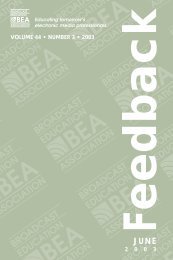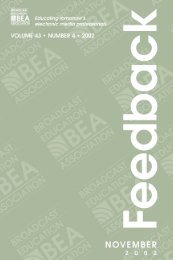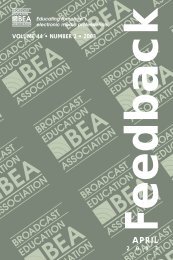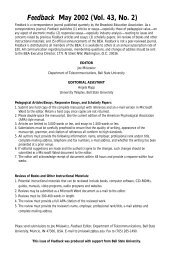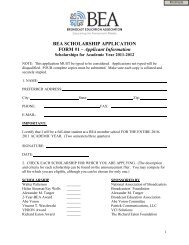Stacks, I. W., and Hocking, J. E. (1992). Essentials of Communication Research.New York, NY: Harper Collins.Strate, L., Jacobson, R. & Gibson, S. (1996) “Surveying the Electronic Landscape: AnIntroduction to Communication and Cyberspace” in Communication andCyberspace. Cresskill, NJ. Hampton Press, Inc.Stempel, G.H., Hargrove, T. and Brent, J.P.(2000) “Relation of Growth of Use of theInternet to Changes in Media Use from 1995 to 1999.” Jounralism & MassComunication Quarterly. Vol 77. No. 1, pp. 71-79Strauss, A. (1987). Qualitative analysis for Social Scientists. NY: Cambridge Press.Strauss A. and Corbin, J. (1990). Basics of Qualitative Research: Grounded TheoryProcedures and Techniques. Newbury Park, CA: Sage. —(1994). Grounded TheoryMethodology: An Overview. In N.K.Denzin and Y.S. Lincoln (Eds.). Handbook of Qualitative Research, 273-285.Thousand Oaks, CA: Sage Publications “Training Journalists for A ConvergentMedia World” (2001) The University of South Florida the Community: Celebrationour Engagement.Tuchman,G.(1978).Making News:A Study in the construction of reality.NY: Free Press.Vande Berg, L.R. and Wenner, L.A. (1991). Television Criticism: Approaches andApplications. New York, NY: Longman.Watson, J., Hill, A. (1997) A Dictionary of Communication and Media Studies (4th)New York, NY: St. Martin’s Press.Wickham, K. W. (1989) The Generation of Story Ideas: An Exploratory Study ofGatekeeping in Local Television news. Paper Presented at the Annual Meeting of theSouthern Speech Communication Association (Louisville, KY, April 6-8).Xiaoming, H. (1991) “Television Viewing Among American Adults in the 1990’s”Journal of Broadcasting and Electronic Media 38, 353-361.Yaokam, R, and Cremer, C. (1989) ENG: “Television News and the New Technology,New York: McGraw-Hill, Inc.Zavoina, S. and Reichert, T. (2000) Media Convergence/Management Change: TheEvolving Workflow for Visual Journalists. The Journal of Media Economics, 13(2)143-151.Endnotes1. The cable news operation’s most recent merger is with the Citrus CountyChronicle. As part of the deal, Bay News 9 will establish a news bureau in thenewspaper’s newsroom and the Chronicle’s reporting staff will join a Bay News 9reporter on the air.2. Larson and Hardy (1977) use the following criteria: A dateline or headline-typestatement followed by copy read by the announcer is a story. (2). A dateline orheadline-type statement followed by a string of filmed or taped presentations on thesame subject, with copy read by the announcer interspersed, is a story. (3). A datelineor headline-type statement followed by a correspondent’s report, together with a lead-inand lead-out by the announcer is a single story. (4) A string of correspondents’ reportsunder a single heading but from different locations and different slants are considereddifferent stories. The lead-in by the announcer is considered part of the first story andthe lead-out is considered part of the last. (5) Headlines that refer to stories later in thenewscast are not considered stories (p.255).3. While sports and weather segments traditionally contain several different elementswithin their time allotments we chose to examine the segment as a single news sourcereferring to them as sports segment and weather segment. We chose to examine onlythose elements found in the news segments or that appear in the news portions of thenewscasts as individual stories. However, very often a news story did appear just priorto or leading into these segments and that story did become part of the analysis.Generally, the sports and weather segments ran approximately between two and halfminutes and three minutes in length for each of the two stations.4. Hyping or hypoing is the “deliberate attempts by stations or networks to influenceratings by scheduling special programs and promotional efforts during rating sweeps(Head, Sterling, and Schofield, 1994, p. 407).5. While it could be argued that the cable news operation, Bay News 9, could beconsidered a player in the convergence news game, it is a 24-hour news service and itdoes not operate in the same manner as the local affiliates.6. It must be mentioned that due to technical problems with the video recorder welost 2 days of both a 6 and 11 p.m. newscast for WTSP. Additionally, on August 23 afootball game overrun for WTSP caused the loss of about half or 18 minutes ofanother 11 p.m. newscast.7. On a final note, convergence does have a price. Media General, corporate giantand leading advocate for media convergence has “In order to help finance convergence,42Feedback February 2003 (Vol. 44, No. 1)BEA—Educating tomorrow’s electronic media professionals 43
canceled its Christmas bonuses for employees for the first time in 30 years. To the3,200 workers at the firm’s 26 TV stations, 50 online enterprises and more than twodozen publications, convergence must seem like the Grinch” (Anzur, 2001).CLASSROOMBACK TO THE BASICS: THE BROADCASTJOURNALISM BEAT COURSEEvonne H. Whitmore, Kent State Universityewhitmore@kent.eduAbstractBroadcast news reporting has been criticized in recent years because of sensationalizedand graphic reporting and an alleged disconnect between reporters and thecommunities they cover. One way some television news operations have responded tothis criticism is through a return to beat reporting. This article proposes a model forinstruction in broadcast beat reporting for journalism and mass communicationprograms, in light of a renewed interest by the profession.Table 1Five stages of the beat reporting classStage Activity PurposeOne Interest survey Matching strengthsBeats assigned Ensuring good fitFull disclosure Avoidance of conflictsTwo Prelim beat reports Acclimation to beatsMapping beats Know people & placesBeat resource books Maintaining contactsThree Story meetings Strategies for coverageWeekly portfolios Progress on beatDeep Critiques Feedback on reportingFour Portfolio Evaluation Overall beat assessmentAccuracy checks Reporter accountabilityDeadline reporting Enterprise reportingFive Exit beat summary Lessons learnedNote: Stages three and four run concurrentlyThe September 11, 2001 terrorists’ attacks on the World Trade Center and Pentagonhave focused attention on American journalists’ ability to report objectively, accuratelyand in great detail about subjects on which they have some expertise. The network andlocal reporters who had cultivated sources through specialized reporting on theMiddle East, terrorism, religion and the military, clearly had the upper hand in howthey reported the story and the credibility of the reports. For those reporters, thesubject expertise that comes with beat reporting made the difference.44Feedback February 2003 (Vol. 44, No. 1)BEA—Educating tomorrow’s electronic media professionals 45


